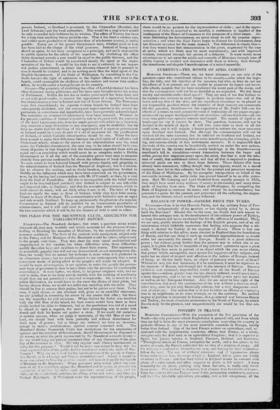CURRENCY-THE MONTH OF APRIL COMING!
. MORNING JOURNAL—There are, we know trimmers on our side of the question—men who considered silence to be security—who admit the impo- liqn the folly, and the injustice of the measure, but who, as they do not see the effects of it at present, and are unable to penetrate its future and inevit- able effects, imagine that we have weathered the worst gust of the storm, and that the consequences will not be so dreadful as we expected. We bid these well-thy and amiable souls—God speed ! They- are men of too fine feelings to be trusted—too nervous to meet dangers in perilous times—too soft at the heart, and too thin of the skin, and too superficial elsewhere to be placed in any responsible position where the interests of their country are concerned. On this question, therefore—on the expediency of Mr. Peel's bill—on the effects of a return to cash payments—and of converting all our paper engage- ments—all our paper mortgages—all our annuities—all our dividends—all tour taxes into gold—our opinion remains unchanged. The month of April is at hand—yet we say it cannot be done. The question, however, will not be decided in the month of April. It will take some time to draw in all the small notes, and it will require a longer period to enforce the same measures upon Scotland and Ireland. But although the consummation will not he reached till the same currency law be inflicted on Scotland and Ireland, we shall, nevertheless, experience, before many mouths pass, the cramping„ pinch- ing, and ruinous effects of this unfortunate measure. It is impossible that the trade of the country can be beneficially carried on under the new systemic.
Every cloud in the money market—every bankrupt in the Gazette—every merchant's bill in circulation—every transaction between the buyer and seller, proves that suspicion preys upon:,the mind, that fear is now the talis-
man of credit, that confidence totters, and that all that is required to produce universal panic • are two or three large failures. Those failures that have already been announced, trifling though they may appear, would, to a mural certainty, have led to this calamity but for the prompt and prescient measures of the Duke of Wellington. By his energetic interposition on behalf of the mercantile interests, the noble duke has proved himself to be an able states- man. Had Mr. Canning and Lord Goderich been equally prompt in 1825, they night have saved many millions of money to the country, and many thou-
sands of families from ruin. The Duke of ;Wellington, by compelling the Bank of England to increase its issues, and extend its accommodation, has prevented a panic for the present, and prevented all-the suffering, the stagna- tion, and the distress which would have followed.


















 Previous page
Previous page